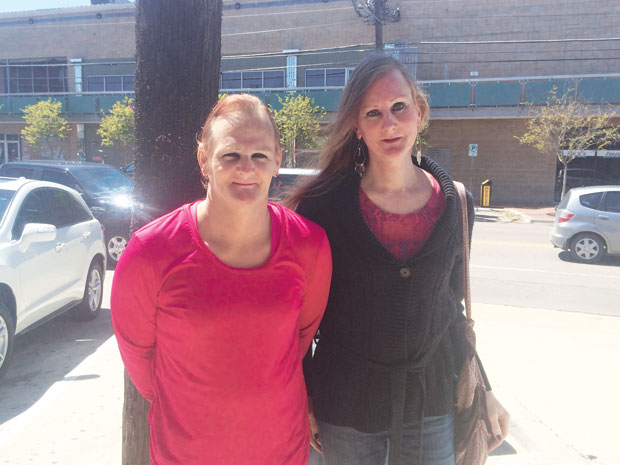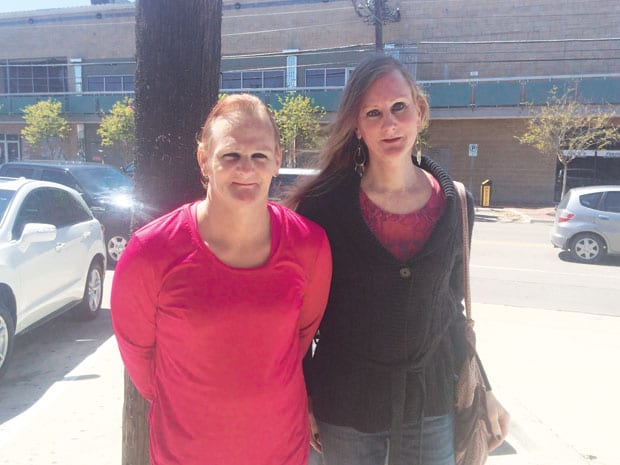Jodielynn Wiley says she was turned away for a 2-year housing program at the shelter because she hasn’t had gender reassignment surgery

CLERICAL ERROR? | Jodielynn Wiley, left, filed a complaint under the city’s nondiscrimination ordinance after she said she was turned away from a housing program at Salvation Army because she hasn’t undergone gender reassignment surgery. She was able to find housing through a shared housing program Trans Pride Initiative President Nell Gaither, right, launched in April. (Anna Waugh/Dallas Voice)
Jodielynn Wiley faced being turned out on the street a few weeks ago when her time at the Dallas Salvation Army was nearing an end.
Wiley, a transgender woman who fled from death threats based on her gender identity in Paris, Texas, in February, was staying at the Carr P. Collins Social Service Center off Harry Hines Boulevard since leaving the conservative and dangerous town. She received an extension on her stay until she could be placed in a housing program.
But when an opportunity came up to place her in a two-year housing program with Salvation Army, she said she was told she didn’t qualify because she hasn’t had gender reassignment surgery.
Wiley was meeting with her case worker and a counselor on April 17 to discuss her options before her exit date of April 21. She was told about the longer program and then asked if she had undergone the surgery.
“After I said no, she said ‘Well, that’s why we can’t give you a room,’” Wiley said. “It was putting me in an uncomfortable situation and very rude.”
Wiley said her counselor chimed in about there being a waiting list for the same program, but Wiley questioned that because two women who arrived at the shelter after she did had already been placed in the program.
“They then tried to say there’s a waiting list,” Wiley said.
Nell Gaither, president of Trans Pride Initiative, sat in on the meeting by phone. She said she explained to the women they were “requiring a special condition that they wouldn’t require of another person.”
Gaither said Wiley being trans “was never hidden” from the staff, but it was wrong to deny her a room in the program because she hadn’t undergone “surgical conditions placed on her in order to meet stereotypical characteristics according to sex or according to gender identity.”
Blake Fetterman, operations director at Carr P. Collins Social Service Center, said the complaint is a surprise because of the Salvation Army’s own nondiscrimination policy.
“What you describe is not in keeping with our nondiscrimination policies,” she said. “Clients receive services and placement with their self-identified gender.”
Fetterman said she spoke to some of the intake staff at the residential programs the center oversees to see how they discuss things with trans people. She said questioning about pre- or post-operation status isn’t part of their conversations with people for placement.
“I have to trust that my staff know how we provide services and provide them in keeping with our policies,” she said. “And if they’re not, then that’s an internal issue.
That’s something that we have to deal with.”
Luckily, Gaither’s recently launched Dallas Trans* Shared Housing Project helped find Wiley a place to stay in the area with another trans woman. The program started in
April to pair trans people who needed housing with trans or trans-friendly shared housing.”
The woman had met Wiley before her meeting with staff where she was denied a room. As luck would have it, she contacted Wiley the same day, and after hearing the situation, told her to bring her things to her home.
Had the program not helped Wiley find a place, Wiley said she’d be on the street or back in Paris fearing for her safety.
“I’m happy, and I’m safe here,” she said.
Wiley has since filed a complaint with the Fair Housing Office under the city’s nondiscrimination ordinance, which bars discrimination in employment, housing and public accommodations. Gender identity is included in the city’s definition of sexual orientation.
Fair Housing spokesman Calvin McAllister said the complaint is still in the early stages, and the parties may not have been contacted yet to start the investigation process.
However, he said it’s a complaint that would be investigated.
Even though the city’s nondiscrimination ordinance protects trans people from housing discrimination, Chapter 46 of the Dallas City Code lists exemptions to unlawful housing practices, including if the “rental of a dwelling in which rooms are leased, subleased, or rented only to persons of the same sex, when the dwelling contains common lavatory, kitchen, or similar facilities available for the use of all persons occupying the dwelling.”
Since the program for which Wiley was considered involved her sharing a room with a woman and sharing a bathroom with another room of two women, Gaither said she worried the shared facilities would be a basis for discrimination.
“To me this says that emergency shelters, as long as they have gender segregated spaces, do not have to worry about any discrimination charges under 46-7 Unlawful Housing Practices,” Gaither said.
But as to whether it could be applied to the shelter’s housing program is another thing that the complaint’s investigation could clear up.
“One reason for filing the complaint was to see how this is actually interpreted by FHO,” Gaither said. “I’m very glad that Fair Housing is taking it up.”
McAllister said the exemption seemed to apply to private homeowners renting a space and preferred not to have the opposite gender renting from them and sharing living spaces.
“The best answer is it’s something we would discuss with the city’s attorney office,” he said. “We’d have to have more facts. Just to say that there was a room with a common area that would automatically accept [the exception], if someone felt that it was unfair, it would be our job to investigate it, and we would look into it.”
McAllister said the only other shelter situation he remembers is several years ago when the office was contacted about someone staying at The Bridge, which was placing people based on genitalia because of the shared restroom facilities. He said the situation never escalated to a formal complaint, but that through meetings with leadership it was determined that people must be placed with how they identity and a private restroom was later opened.
As for Wiley’s situation, he said she has a basis for a complaint and it’d be the first complaint for a shelter in the area, which could help formally establish the protocol for shelter programs.
“They have no right to say how they are perceived is who they are,” McAllister said. “You have no right to tell [transgender people] who you think they are. It’s degrading and unlawful.”
This article appeared in the Dallas Voice print edition May 2, 2014.











